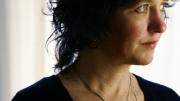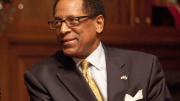The director of The Harvard Foundation for Intercultural and Race Relations, professor of neurology S. Allen Counter, and Laura Kasischke, a poet and novelist, will headline this spring’s Phi Beta Kappa (PBK) Literary Exercises—the first formal event of Commencement week 2015. The event, at which the undergraduates elected to PBK will also honor outstanding faculty teachers, is to take place on Tuesday, May 26, at 11 a.m. in Sanders Theatre.
Kasischke, who teaches in the University of Michigan’s master of fine arts program, is known for her fiction as well as her poetry. In a dual review of her 2011 collection Space, in Chains—which won the National Book Critics Circle Award for poetry—and her concurrent novel The Raising, critic and professor of English Stephen Burt wrote in The New York Times:
No poet has tried so hard to cut through suburban American illusion while respecting the lives, young and old, that it nurtures or saves. No poet has joined the chasm of ontological despair to the pathos of household frustration so well as Kasischke at her best.
Both Kasischke’s poetry and her fiction chronicle domestic and familial life. Space, in Chains offers reflections on the deaths of her parents as well as her own mortality. Her novels, the Poetry Foundation notes, are tied to her poetry by similar senses of shifting narrative. They focus on the themes of domestic life in the context of major upheavals such as a fatal car accident and a school shooting. The latter is the subject of The Life Before Her Eyes, which was turned into a feature film. Kasischke has received fellowships from the National Endowment for the Arts and the Guggenheim Foundation.
Counter, who arrived at Harvard as a postdoctoral student in neurobiology and has pioneered academic and institutional initiatives at the University for four decades, will be the ceremony’s orator. He is a professor of neurology at Harvard Medical School and a neurophysiologist at the Massachusetts General Hospital, where his research focuses include the physiology of hearing, the neurotoxicity of lead and mercury, and multiple sclerosis. This work has dovetailed with his secondary academic interest in the ethnography of indigenous peoples in Central and South America; he continues to conduct studies of lead and mercury exposure in the Andean populations of Ecuador. (He wrote about his work with descendants of slaves and indigenous rain forest populations in Suriname in “Old Africa’s Outpost in the New World,” in this magazine’s January-February 1979 issue.)
In 1981, then Harvard president Derek C. Bok named Counter founding director of the new Harvard Foundation, with a mandate to “improve relations among racial and ethnic groups within the University and to enhance the quality of our common life.” Today, the foundation sponsors more than 200 campus programs annually. Counter received the NAACP Image Award in 1989, and the National Medical Association Hall of Fame Award in 1994. He also holds a doctor of medical science degree from Stockholm’s Karolinska Institute, where he was appointed visiting professor of neuroscience in 2003. Since 2004, Counter has also served as the consul general of Sweden in Boston and New England.










